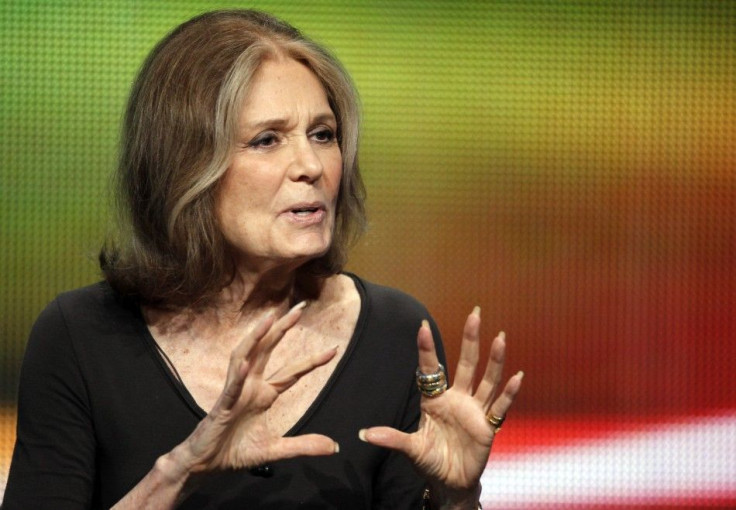Feminist Gloria Steinem hopes TV doc inspires

Gloria Steinem may no longer be making the kind of national headlines she drew in the 1970s during the heady days of the women's rights movement.
But she is hoping that a TV documentary about her 40 years on the frontlines of feminism will inspire a new generation to continue the fight because, she says, there is still plenty of work to be done.
"I hope (women) will look at the distance we have come in 40 years and say to themselves, here we are now and where do we want to be in 40 more years? -- and also that they can do it.
"If I can do it, they can certainly do it. We learn from each other's stories. So each of us has to try to tell our story honestly, otherwise the media makes us feel that people who do something are different from us," Steinem told Reuters.
"Gloria: In Her Own Words" profiles the now 77 year-old crusader using old news clips, archived interviews and Steinem's own reflections.
The documentary makes its debut on cable channel HBO on Monday and will be replayed throughout August.
It sees the journalist who became one of the leading lights of the feminist revolution in the 1970s and 80s assess her public and personal life in a way that she has rarely done.
"You can't see the story of your own life. If you are in the forest, you just see the trees. You don't see the forest. So I just tried to answer questions the best I could," she told Reuters, with a laugh.
The documentary reminds those who now regard Steinem as an icon that she also loved to tap dance, used her trademark huge aviator glasses as a barrier to hide behind, does not regret never having children and suffered from depression and low self-esteem in the 1990s when she also was diagnosed with breast cancer.
60 MORE BATTLE YEARS AHEAD
But agreeing to the documentary does not mean that Steinem is ready to hand over the feminist baton, or that she sees her life as a framework for the history of the women's movement ("because no single person's life can do that").
In fact, the most important piece of advice the founder of the ground-breaking Ms. Magazine offers to young women today "is not that they know who I am, but who they are."
Not surprisingly, Steinem firmly rejects the notion that feminism is no longer an issue in the 21st century, or that the word itself has become tarnished.
She believes that women's rights likely have another 60 years to go before they are fully absorbed into Western culture, following a roughly 100-year trend of acceptance for other movements, like women's suffrage and the abolition of slavery.
"Just ask (women) about their lives. Do they feel as if they are as safe in the streets as men are? Are their husbands raising the kids as much as they are? Do they feel that age is the same penalty for them as for men?," she told Reuters.
"Women don't have the power to be our own worst enemy," she said in the same calm tone that marked her replies to patronizing comments in the 1970s and verbal attacks -- sometimes from her own sex -- years later.
"We are not, for the most part, the people making the laws or deciding the salaries...If you put me in a room with 100 people and 70 wanted to move forward, and 30 disagreed, I would probably go over and try to convince the 30. But we have to move forward with the 70," she said.
These days, Steinem moves forward with a busy schedule of lectures, appearances and travel to campaign on issues ranging from sex trafficking and female genital mutilation to ageism.
"Every place I go, I tell my age because I figure it's like a form of coming out. I'm 77," she said.
She has faith in young women to continue the battle. "This generation of young women is actually much more feminist than we ever were. They're actually much more supportive of all the issues of equality."
Steinem says in the documentary that "feminism doesn't need a name, and one day it won't".
And she would like to be around to see that day herself. "I have so loved being here and I do hope to live to be 100. I have loved it so much I never want it to end," she said.
© Copyright Thomson Reuters 2024. All rights reserved.











